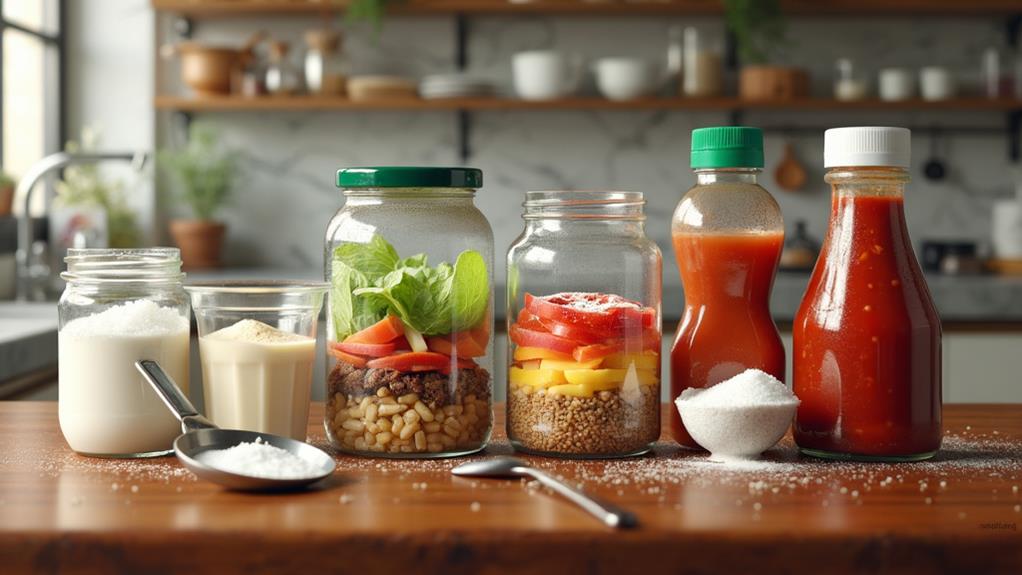
To effectively maintain ketosis on a ketogenic diet, daily sugar intake should be limited to 0-30 grams, with total carbohydrate intake kept between 20-50 grams. This restriction encourages the body to use fat as its primary energy source, aiding in better glycemic control and reducing the risk of insulin resistance. It is essential to monitor sugar hidden in processed foods, which can undermine dietary efforts. Consuming low-carb sweeteners like stevia or erythritol can help satisfy sweet cravings without impacting ketosis. Staying within these limits can contribute greatly to metabolic health and weight management. Discover more about hidden sugars and keto strategies here.
Key Takeaways
- Daily sugar intake on a keto diet should ideally be between 0-30 grams to maintain ketosis.
- Total carbohydrate intake should be limited to 20-50 grams per day for effective ketosis.
- Natural sugars from fruits and vegetables count towards the daily carbohydrate limit.
- Hidden sugars in processed foods need careful monitoring to avoid exceeding sugar limits.
- Low-carb sweeteners like stevia and erythritol can help satisfy sweet cravings without disrupting ketosis.
Understanding the Keto Diet
To maintain this metabolic state, daily carbohydrate intake should generally be restricted to 20-50 grams. This limitation guarantees that glucose levels remain low, prompting the body to utilize fat as its primary energy source.
Unlike conventional diets, where carbohydrates are a significant part of daily intake, the keto diet minimizes their role to facilitate ketosis. In addition, it is crucial to understand that sugar, which is classified as a carbohydrate, must also be closely monitored.
The ketogenic diet recommends a daily sugar intake ideally ranging from 0-30 grams. This stringent control over sugar and carbohydrate intake is essential for successfully adhering to keto principles and achieving the desired metabolic state.
Studies indicate that adherence to a ketogenic diet can lead to improved glycemic control and less reliance on diabetes medications.
Sugar and Carbohydrates
Monitoring sugar and carbohydrate intake is essential for anyone following a ketogenic diet. To maintain ketosis, daily carbohydrate intake should be restricted to about 20-50 grams, with the ideal sugar intake being 0 grams. This strict regulation is imperative because sugar, categorized as a carbohydrate, can considerably impact blood sugar levels and disrupt ketosis.
Understanding sugar metabolism is critical; when sugars are consumed, they are quickly broken down and absorbed, leading to spikes in blood glucose levels and insulin response, which can hinder the ketogenic state. Additionally, it is important to avoid refined carbohydrates like white bread and white rice, which convert swiftly to glucose.
Carbohydrate sources include not only obvious sugars and sweets but also natural sugars found in fruits and vegetables. While these natural sugars may seem benign, they can contribute to the overall carbohydrate count and potentially interrupt ketosis if not moderated carefully.
Furthermore, hidden sugars in processed foods can complicate dietary adherence. Consequently, reading nutrition labels meticulously is paramount for identifying and reducing sugar intake effectively.
To optimize the keto diet, regular testing of blood glucose and ketone levels is recommended. This practice helps individuals understand their personal tolerance to sugar and carbohydrates, providing valuable insights for better dietary management and ensuring sustained ketosis.
Daily Sugar Limits
Accurately managing sugar intake is a cornerstone of maintaining ketosis on a ketogenic diet. It is generally recommended to limit daily sugar intake to around 20-30 grams to stay in ketosis. This is a considerable reduction compared to the average American diet, which typically includes 100-150 grams of sugar per day. Monitoring both total carbohydrate and sugar intake is essential, as sugar is classified as a carbohydrate.
To aid in tracking intake, it is vital to read nutrition labels carefully. Many processed foods contain hidden sugars that can easily push one over the daily limit. Additionally, natural sugars from fruits and vegetables should be moderated, as they contribute to the overall daily sugar limit. Utilizing sugar substitutes can help manage cravings without exceeding daily sugar limits.
| Item | Recommended Limit (grams) |
|---|---|
| Daily Sugar Intake | 20-30 |
| Average American Intake | 100-150 |
| Total Daily Carbs (keto) | 20-50 |
| Natural Sugars (fruits/veg) | Moderate |
Incorporating these guidelines can greatly improve one's ability to maintain ketosis, making it easier to achieve the desired health benefits of the ketogenic diet.
Effects of Excess Sugar
Excess sugar consumption poses considerable health risks, including increased insulin resistance, higher likelihood of weight gain, and a greater risk of type 2 diabetes and heart disease, all of which undermine the objectives of the keto diet.
Raised blood sugar levels can disrupt ketosis, making it difficult to maintain the metabolic state essential for the diet's effectiveness. Additionally, high sugar intake can lead to inflammation and energy crashes, further complicating adherence to dietary restrictions and overall health goals.
Research indicates that a reduction in HbA1c levels can markedly improve long-term glycemic control in diabetics.
Furthermore, stable blood sugar levels contribute to reducing the risks of hyperglycemic episodes.
Health Risks Overview
How detrimental can excessive sugar consumption be to one's health? The implications are considerable, affecting multiple aspects of wellbeing. One of the primary concerns is its impact on sugar metabolism and insulin response. Excessive sugar intake can lead to insulin resistance, a condition where the body's cells become less responsive to insulin, making it difficult to regulate blood glucose levels. This can pave the way for type 2 diabetes, a chronic disease with serious health implications.
In addition, high sugar consumption is closely linked to obesity. Studies indicate that individuals consuming large quantities of sugar are more likely to gain weight, which in turn increases the risk of developing obesity-related conditions such as metabolic syndrome.
Moreover, diets rich in refined sugars can raise triglyceride levels and promote inflammation, both of which are risk factors for heart disease. Chronic inflammation, often exacerbated by high sugar levels, is another critical concern. It has been associated with various conditions, including non-alcoholic fatty liver disease.
Blood Sugar Impact
Why is it essential to monitor sugar consumption, particularly in the context of blood sugar levels? Excessive sugar intake can greatly impair blood sugar regulation, leading to a cascade of metabolic disturbances.
One of the primary concerns is the development of insulin resistance, a condition where the body's cells become less responsive to insulin. This can escalate the risk of type 2 diabetes and metabolic syndrome.
High sugar consumption also results in pronounced spikes and crashes in blood sugar levels, which can adversely affect energy and mood. Chronic overconsumption further contributes to inflammation, exacerbating conditions like heart disease.
Here are key points to reflect on:
- Insulin Resistance: Regular high sugar intake can lead to insulin resistance, increasing the risk of type 2 diabetes.
- Blood Sugar Spikes: Excess sugar causes considerable fluctuations in blood sugar levels, impacting energy and mood.
- Inflammation: Chronic sugar consumption is linked to systemic inflammation, worsening various health conditions.
- Blood Sugar Control: Reducing sugar intake improves blood sugar regulation, supporting overall metabolic health.
For those on a keto diet, limiting sugar to 20-30 grams per day helps maintain stable blood sugar levels, promoting the diet's goal of sustained ketosis and improved insulin sensitivity.
Weight Gain Concerns
The consequences of excessive sugar consumption extend beyond immediate health impacts, greatly influencing long-term weight management. Consuming more than the recommended 20-30 grams of sugar daily on a keto diet can markedly raise overall calorie intake, promoting fat storage. This is particularly concerning because refined sugars are linked to insulin resistance, which impairs the body's ability to burn fat effectively and can facilitate weight gain.
Studies have consistently shown that high sugar intake correlates with an increased risk of obesity, with sugary beverages being especially problematic due to their high caloric content and minimal satiety. These metabolic effects are compounded by chronic sugar consumption, which can lead to non-alcoholic fatty liver disease (NAFLD). NAFLD is not only a marker of metabolic syndrome but also contributes to further weight gain.
Furthermore, reducing sugar intake is essential for stabilizing blood sugar levels, which helps mitigate sugar cravings and supports healthier eating habits. By adhering to the keto diet's stringent sugar limits, individuals can better manage their weight and avoid the adverse metabolic effects associated with excess sugar.
As a result, understanding the impact of sugar on weight gain is vital for effective long-term weight management.
Hidden Sugar Sources

Steering through the keto diet requires a keen awareness of hidden sugar sources that can derail your efforts to maintain ketosis. Hidden sugars are ubiquitous in many non-dessert foods, including pasta sauces, salad dressings, and condiments.
Effective sugar detection involves scrutinizing nutrition labels for hidden ingredients such as high fructose corn syrup, sucrose, and maltodextrin. These sugars may be listed under various names, complicating efforts to manage daily sugar intake. Hidden sugars can also appear in products marketed as "sugar-free," making it crucial to check the total and net carbs to avoid unintended intake.
Recognizing these hidden sugars guarantees you stay within your carbohydrate limits and maintain ketosis.
Processed foods, including bread, granola bars, and flavored yogurts, are common culprits of added sugars. Here are some key points to guarantee you stay within your carbohydrate limits:
- Read Labels Carefully: Look for hidden sugars in the ingredients list, even in foods labeled as "sugar-free."
- Be Wary of Condiments: Ketchup, barbecue sauce, and salad dressings often contain significant amounts of added sugars.
- Check Processed Foods: Items like bread and granola bars can contain surprising amounts of carbohydrates.
- Consider Natural Sugars: Foods such as whole milk and fruits like bananas and grapes have natural sugars that should be counted in your daily intake.
Low-Carb Sweeteners
Understanding hidden sugar sources is a notable step in managing your carbohydrate intake on a keto diet. Equally important is the selection of appropriate low-carb sweeteners. Popular choices such as stevia, erythritol, monk fruit, and allulose offer minimal to no carbohydrates and calories, making them compatible with maintaining ketosis.
It's also essential to be aware of fillers that might be present in monk fruit products, as they can add unwanted carbs.
Erythritol, a sugar alcohol, provides about 70% of the sweetness of sugar and only 0.24 calories per gram, making it an excellent option for keto baking and cooking. Its low caloric content and minimal impact on blood glucose levels make it a favored choice among keto enthusiasts.
Monk fruit sweeteners, derived from the monk fruit, are remarkably sweeter—approximately 200 times more than sugar. This high sweetness intensity means that only small quantities are needed to achieve the desired flavor, thereby keeping carb intake in check.
Allulose offers another alternative, with about 70% of the sweetness of sugar but virtually no net carbs. It is absorbed differently in the body, making it an effective low-calorie sugar substitute.
In sweetener comparison, these options help satisfy sweet cravings while adhering to a strict daily carbohydrate limit of 20-50 grams, supporting overall keto dietary goals.
Sugar Reduction Strategies

Implementing effective sugar reduction strategies is fundamental for maintaining ketosis on a ketogenic diet. To achieve optimal results, limiting daily sugar intake to ideally 0 grams and adhering to a maximum of 20-30 grams of total carbohydrates is essential. Incorporating keto-friendly chocolate brands can help satisfy sweet cravings without derailing your diet.
Here are some evidence-based strategies to help curb sugar cravings and guarantee dietary compliance:
- Utilize Low-Carb Sweeteners: Incorporate sweeteners like stevia or erythritol, which provide sweetness without increasing sugar or carb intake.
- Read Nutrition Labels: Diligent label reading is crucial to identify hidden sugars in processed foods, preventing unexpected carbohydrate spikes that can derail ketosis.
- Focus on Whole, Unprocessed Foods: Prioritizing whole foods minimizes exposure to added sugars and enhances nutrient intake, supporting overall health and keto goals.
- Explore Keto-Friendly Recipes: Experimenting with keto-specific recipes can provide enjoyable dessert alternatives and meal options, reducing the temptation for sugary snacks.
Adhering to these strategies can greatly enhance your ability to maintain ketosis and achieve the desired health outcomes associated with a ketogenic diet.
Frequently Asked Questions
How Much Sugar Is Allowed per Day on Keto?
On a keto diet, it is recommended to limit sugar intake to 20-30 grams per day. Opt for sugar alternatives and choose keto snacks to maintain ketosis, optimize fat-burning, and stabilize blood glucose levels effectively.
What Happens if You Eat a Little Bit of Sugar on Keto?
Consuming a small amount of sugar on a keto diet can trigger sugar cravings and raise insulin response, potentially disrupting ketosis. This shift may hinder fat burning and lead to temporary fatigue or energy crashes.
What Should Your Sugar Level Be on Keto Diet?
On a keto diet, the ideal level of keto sugar should be minimized to guarantee ketosis, ideally aiming for near-zero grams. Regular monitoring of blood ketone and glucose levels is essential to maintain metabolic health and individual carbohydrate tolerance.
Should You Eat Carbs or Sugar on Keto Diet?
On a keto diet, it is essential to minimize carbohydrate intake to maintain ketosis. Utilize carb alternatives and sugar substitutes to satisfy cravings while adhering to the carbohydrate limit, ensuring ideal fat-burning and stable insulin levels.
Conclusion
The ketogenic diet necessitates strict regulation of carbohydrate intake, including sugars, to maintain ketosis. Adhering to a daily limit of approximately 20-50 grams of total carbohydrates, with sugar constituting a minimal fraction, is crucial. Excessive sugar intake can disrupt ketosis, leading to adverse metabolic effects. Awareness of hidden sugars and employing low-carb sweeteners are essential for effective sugar reduction. Adopting these strategies can support metabolic health and adherence to ketogenic dietary principles.










No Comments